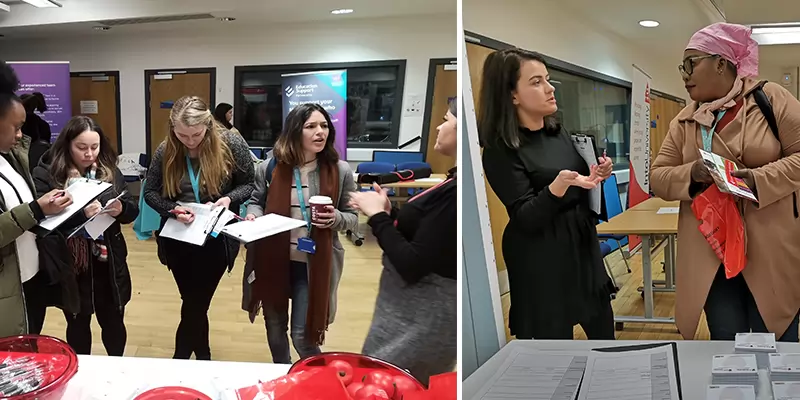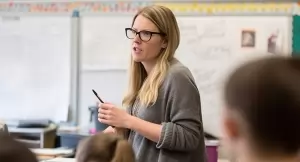Whilst parents are overwhelmed with the pressures of home schooling and concerned by the lack of live lessons provided, confusion has erupted over state school head teachers who are blocking teachers from hosting online lessons due to privacy concerns. They are claiming streaming live-lessons from inside a teacher's home is a 'huge invasion of privacy' and takes away 'professional distance'.
But many have asked why teachers don't utilise Zoom's 'virtual background' feature - or present in front of a blank wall. Others have asked why teachers don't go into schools to teach their remote lessons from an empty classroom.
Almost three million pupils were not receiving any live lessons meaning they may not be having any interactive schooling with their teachers during lockdown.
Headteachers Banning Zoom is the fault of over-zealous teaching unions, said Chris McGovern, chairman of The Campaign for Real Education.
Speaking to Mailonline he said: “Of course you can change a background. They are finding problems where no problems exist.”
“It is teachers looking for reasons to keep schools closed as part of a political battle with the Government. Here we are looking after children's futures. It seems that for a very minor aspect of this problem they are prepared to sacrifice children's futures, particularly underprivileged children.
He blames unions for creating 'an atmosphere of threat and intimidation' which puts pressure on teachers, adding: 'I don't think teachers should be seen as pawns in a political battle'.
Not all head teachers had this view. Pauline Wood, head teacher at Grange Park Primary School in Sunderland, said she was 'at a loss' as to how live Zoom lessons could be deemed a privacy breach.
She told MailOnline: “Teachers can set up their own devices in a position which suits them surely?”
“If in school, it is no different from a regular lesson. If at home, choose a blank background.”
Last summer militant teaching unions strongly urged teachers not to live-stream and said teachers must be able to choose whether to live-stream lessons or not and that it should only be used 'when essential'
Pushy parents
The largest teaching union, the National Education Union appeared to suggest that only pushy parents want live lessons, adding that the call for live teaching is 'often related to minority, but insistent, parental pressure'.
And teachers' union NASUWT is strongly advising members to avoid live lessons unless there are measures in place to stop privacy breaches. The union goes as far as raising privacy concerns about pupils recording teachers' live lessons and uploading them to pornography websites.
School governor and former-teacher Calvin Robinson said he understands that some schools don't allow teachers on the premises to teach remotely. But he said a different digital background would fix any worries about teaching at home.
He said: 'It depends if they're allowed in schools, some have sent everyone home without the option to come back. 'I can relate, my mother's a lecturer and she expressed those same concerns, but she just blurs out her background. 'It can make people feel uncomfortable, but there are methods you can take. 'What I'd like to see is children back in classrooms'.
Mike Power, teacher and head of year in Manchester, said using an alternate background is 'a sensible approach'. He said: 'There will be steps people can take to keep the intrusion to a minimum such as blurring backgrounds, even removing photos from a wall to use as a blank background if necessary. 'No teachers are sat thinking how can I avoid delivering live lessons, which at times it can feel like that's what people think. 'Teachers fundamentally want to teach as best they can in the circumstances.'
Stressed out and under pressured parents have pleaded with schools to step up live online classes, as experts warned the lack of real-time lessons threatens to widen the equality gap between state and private students.
The mounting pressure on parents to juggle work and home life has been heightened by the demand to take on the role of teachers too - as the abrupt return to virtual learning wreaks havoc across the school system.
Most independent schools and top-performing state schools have rolled out full days of live lessons via Zoom and other video platforms since the new national lockdown came into force. But large numbers of secondaries and primaries, particularly in poorer areas, are relying on pre-recorded lessons, YouTube videos and online worksheets for their pupils.
Mark Lehain, director of the Campaign for Common Sense, said: 'Private schools had a big advantage: if parents can afford school fees, they've definitely got decent broadband and laptops galore at home. “State schools couldn't rely on this. But the teaching unions were a disgrace, and made things a lot worse by telling staff not to plan at home, or that they didn't need to do online teaching.”
Leading education Professor Alan Smithers explained: "Children want to learn in real-time and thrive by interacting and learning with their friends. Pre-recorded lessons are no way near to being in school."
According to government guidance, primary school pupils should have an average of three hours work a day, and secondary schools should have four.
Lessons should be delivered by teachers through "curriculum resources or video", though teachers unions have stressed educators have the choice to live-stream lessons or not and they should only be used "when essential".
A poll of 800 subscribers to the app Parent Ping found: -
- 8% of parents said their child received more than five hours of live lessons
- 13% said their children were in live lessons for three to four hours
- 11% reported one to two hours
- 31% said their children had no live lessons at all
- 11% had less than one hour
Following the closure of schools last Tuesday, teachers swamped social media with complaints that they did not want to deliver lessons via video platforms.
According to the Daily Mail one teacher from Manchester said she "feels sick" with nerves before teaching a live lesson, saying: "The fact it’s my home does feel invasive."
Kent headteacher Cassie Young suggested "professional distance" was essential, and claimed "working at home and seeing inside people’s homes feels like a huge invasion of privacy". She added she "can't and won't" agree to staff doing live lessons due to pressure, safeguarding and workload for teachers.
Lauren Evans blasted the sanctimonious stance of staff online, writing: "Just blur your background! Microsoft Teams and Zoom, maybe you should post tips to help teachers feel more comfortable hosting live classes?"
Michael Igoe commented, "It's time teaching unions joined the real world. Live zoom meetings are a way of life for business, we've been doing it for years from home."
Maths Teacher Jamie Frost from South-West London has won a Covid Hero Award after his free tuition website helped students around the world study during the Covid-19 lockdown.
Jamie Frost, who works at Tiffin School in Kingston upon Thames, received a one-off prize £33,000 for going above and beyond in the coronavirus crisis to help keep pupils learning.
He was one of 10 finalists shortlisted for the sixth annual Varkey Foundation Global Teacher Prize.
His Dr Frost Maths tuition website that he runs from home had more than million-page views a day when schools shut amid Covid-19 and has had more than seven million teaching resource downloads. His online learning platform is funded by the Mayor of London's office, free to use and used worldwide.
The ceremony was broadcasted virtually from the Natural History Museum in London, actor Forest Whitaker announced that Mr Frost had been awarded special recognition.
On receiving the Covid Hero Award, Mr Frost said: “I feel absolutely fantastic”.

“It’s such an honour to receive this award and I’m just so happy that so many students have been able to benefit from my site, and that’s what I want really.”
Mr Frost was selected from more than 12,000 nominations and applications from over 140 countries for the Global Teacher Prize.
In a video message, Whitaker said: “Your creativity and dedication have illuminated millions of minds for free. Thank you, Jamie. Thank you to all the world’s teachers.”
Despite not achieving the pass mark for his 11-plus exams, his own maths teacher knew he was able and would often let him get on with his own work while in the classroom. He had attended sixth form at Tiffin School, where he currently teaches, and took up the opportunity when offered work experience there.
While studying for his PhD in computer science he realised that he wanted to go into teaching when helping to educate undergraduates.
He told The Times that he 'hated' working in the banking sector, saying:' I was working on trading strategies for bond traders. 'I was just helping an institution with loads of money make more money. It wasn’t a very good feeling.'
Prime Minister Boris Johnson said in his video message, Mr Frost’s “ingenuity” had “given hope and support to millions of children throughout the world”.
Mr Johnson added: “It’s been incredible to see how teachers have adapted to home learning and used technology to continue with lessons throughout the pandemic.
“You don’t just represent the heroic teachers in the United Kingdom but also across the whole world.”
Education Secretary Gavin Williamson said: “I would like to send my warmest congratulations and thanks to Jamie for his outstanding innovation and dedication in helping pupils and fellow teachers around the world.
“It is a truly remarkable story, and I am pleased he is receiving the worldwide recognition he thoroughly deserves.”
Million-dollar prize
Comedian and actor Stephen Fry announced the main prize of £1million went to Ranjitsinh Disale, a village primary school teacher from India who was praised for improving the education of girls.
He started teaching at the school in 2009, when it was in a rundown building next to a cattle shed, according to organizers. School attendance was low and teenage marriage common. He also provides online science lessons for pupils in 83 countries and runs an international project building connections between young people in conflict zones.
Prize organisers said he was honoured for having "transformed the life chances" of girls at the Zilla Parishad Primary School in Paritewadi, in Maharashtra state.

In his winning speech, Mr Disale said he would share half of the prize money with the nine runners-up in the competition - the first time the Global Teacher Prize winner has done this.
Andria Zafirakou has been the only British winner of the million-dollar prize. In 2018, she won the prize for her work as the deputy headteacher at Alperton Community School in Brent, West London.

At the time, she said: “At the end of the day, it's all about the kids and giving them the opportunities to find the best of themselves.” “Anything is possible.”
Founder of the Varkey Foundation, Sunny Varkey that set up the teachers' competition, said "by sharing the prize you teach the world the importance of giving".
Just a day before the second lockdown kicks in, the Department of Education (DfE) have issued new guidance; "face coverings should be worn by adults and children aged 11 and above when moving around the premises, outside of classrooms or activity rooms, such as in corridors and communal areas where social distancing cannot easily be maintained", and the same applies to further education colleges.
This should be implemented as soon as possible, however the department said, but can have until Monday 9 November if they require additional time.
Face coverings had already been required for secondary school pupils within areas under Tier 2 and Tier 3 restrictions in England, with those local restrictions now to be replaced by the national measures.
Those who are exempt from wearing face coverings are primary school children and those older children with special educational needs or disabilities. It will also remain at the discretion of primary schools as to whether staff and visitors should wear face coverings in communal spaces.
The announcement brings English schools more in line with their Scottish counterparts who have been under stricter COVID-19 restrictions for several weeks.
The DfE also says teachers with serious underlying health issues should keep away from the premises. "Those individuals who are clinically extremely vulnerable are advised to work from home and not to go into work," the guidance says. "Staff should talk to their employers about how they will be supported, including to work from home where possible, during the period of national restrictions.” "All other staff should continue to attend work, including those living in a household with someone who is clinically extremely vulnerable."
Paul Whiteman, general secretary of the NAHT school leaders' union, said the lockdown was announced four days ago and that it "beggars’ belief that schools have had to wait until now to find out how it affects them". "Frankly, it is ridiculous that this new guidance has landed on school leaders' desks less than 24 hours before the start of the national lockdown. "There is very little in the guidance that could not have been communicated with schools 72 hours ago."
Mr Whiteman also expressed concern about the impact vulnerable teachers staying at home would have a schools' ability to operate. "Given the restrictions around clinically extremely vulnerable staff, the reality is that some schools may now find it increasingly difficult to remain open to all pupils."
Geoff Barton, general secretary of the Association of School and College Leaders, welcomed the move, but said: "It will mean that there are more staff missing from the workplace, on top of those who are self-isolating. "It is imperative that the government reimburses schools and colleges with the cost of hiring supply cover for staff absence. "We have received reports of schools having to spend £6,000 per week on supply cover, and this situation is going to become worse - schools and colleges cannot sustain these costs."
Mr Barton said the extension to the rule on face coverings was a "sensible response to rising Covid levels, and will act as an extra level of protection on top of the other safety measures in schools". He added: "The government's education recovery planning does need to take into account the impact of these restrictions on health and wellbeing."
Education Secretary Gavin Williamson said: "We must put the interests of our children and young people first, especially when the benefits of being in the classroom are clear.
"Children are settled back into their routines and schools have protective measures in place keep their staff and pupils as safe as possible.
"Education is a national priority and we cannot allow it to be disrupted again."
David Goodhew, head of £21,000 a year Latymer Upper School in Hammersmith, said a survey of staff at his school found they feel reassured by pupils having to wear masks in the classroom.
Since August, pupils at the school had to wear masks in lessons and in communal areas. Mr Goodhew said: “Pupils and staff in the classroom are still wearing masks and that has worked well for us. I wouldn’t be surprised if more schools followed suit.” He added: “Our experience is that there are solutions to the two main objections, namely pupil discomfort and problems with communication.”
Mr Goodhew said he does not believe that schools are “engines of transmission” of Covid-19, but added: “I think people who work in schools are absolute heroes. Everyone else is being told stay at home if you can, but teachers are going in.” He said it was vital for the mental and physical health of children that schools stay open, and warned that many have “whole year groups or large numbers of staff who are off having to isolate as a precaution and waiting a long time to get test results back”.
Related articles
Welcomed changes for supply teachers in new guidance
How teachers can take care of their mental health during Covid-19
How to effectively teach from home
Coronavirus has thrown us into a world of chaos and uncertainty. As a result of growing restrictions schools are having to figure out and adapt to new ways of delivering their pupils education.
We’ve put together some helpful tips you can follow if you find yourself suddenly becoming a virtual teacher.
Establish a work space
When working from home it’s important to differentiate home space from work space. This will help create a clear division between your work life and personal life.
Make sure your work space is light, airy and not cluttered. To avoid any unnecessary distractions whilst delivering online classes, keep your background plain and reduce any glares from windows by closing the curtains.
If space is limited don’t worry, you can still change the space around you. For example, having text books, pens, paper and worksheets on hand during work and then putting them away out of site when you finish work.
Plan ahead and test
Technology is vital for remote learning being successful, however using new technology for the first time can be daunting. Spend some time familiarising yourself with the new resources you’ll be using. Speak to other colleagues with their experiences and carry out a trial run to make sure any technical glitches are ironed out.
Decide as soon as possible who will be responsible for what types of IT support, and how they will be reachable by students, families, and staff. Make sure they all know how to reach out for support.
Give teachers, students, and families video and written instructions on how to use your platform so they can answer some of their own questions before reaching out for help.
Structure and schedule
Your school should provide with a timetable to follow and list of what topics to cover. However, if your school does not provide this then we would strongly recommend you create your own. This will help keep you in routine and help you to plan your work.
Pupils will also benefit from a structured day which has routine similar to how they would have had if they were learning in school.
A structure and schedule will also help draw the line between ‘work time’ and ‘personal time’ giving you a balance of them both. Include time for breaks so that your pupils and yourself have a break as you would in school.
Set expectations
Talk to your pupils and help them understand the new way of learning. Listen to their concerns, questions and reassure them. This will be just as daunting for them as it is for you. Tell them what you are expecting from them including homework, deadlines, time keeping and behaviour. Keep parents fully informed and make sure they are aware your expectations. You’ll need their contribution to make sure this works.
Let go of perfectionism
Virtual teaching is a new challenge for everyone, so try not to overcomplicate the work you are delivering. Don’t worry about the finer details or trying to make your slides all singing and dancing. When teaching online keeping things simple is key. This will help to avoid any technical glitches such as files not loading correctly or applications freezing.
Remember everyone will be using different types of devices i.e. desktop PC, laptops to tablets so it’s important this is taken into account.
Make it fun
No matter how old your students are, they will all appreciate from a bit of fun. Plan some time in during the day for quizzes, games and even throw in some meditation, yoga, or just quiet time to help them relax and prepare for what’s next. There are lots of online activities you can access and do a group. It will help them to release energy and prevent them from burning out.
Additional resources
Don’t try to do create everything yourself, use the array of online resources available. There are thousands of free projects, worksheets, educational videos, guides and audio clips you can download. Below are some of the popular online resources.
BBC Teach https://www.bbc.co.uk/teach
BBC Bitesize https://www.bbc.co.uk/bitesize
Twinkl https://www.twinkl.co.uk/
We Are Teachers https://www.weareteachers.com/
2 simple https://2simple.com/purple-mash/
Classroom secrets https://kids.classroomsecrets.co.uk/
iDEA https://idea.org.uk/about
History Learning Site https://www.historylearningsite.co.uk/
Find time for yourself to reflect and re-focus
Online learning is a new experience for you and your students. Make time for yourself to reflect on how the experience is going for you and for your students—but remember: you’re not expected to be perfect.
Ask yourself questions like:
- Are all the children engaged and focused?
- Are you able to deliver what you set out to do?
- What could I do to make learning more accessible, inclusive, and meaningful?
- How are we, as a class, doing physically, mentally, and emotionally?
It’s also worth asking colleagues to see how they are getting on with online teaching. Sharing ideas, tips and collaborating together will help to deliver a more effective education.
Education Secretary, Gavin Williamson has announced next year’s GCSE and A-level exams will be going ahead – but with some changes. Firstly, content will be reduced for some subjects and secondly, exams will be pushed back by three weeks to give students more time to prepare and make up for lost learning.
The government has rejected calls made by unions and leading figures in Education to cancel exams and instead use teacher assessment grades.
Usually exams start around the middle of May, they will now start from 7 June. Some exams – such as one maths and one English GCSE paper – will be scheduled for before May half-term. This will give students
Normally results are handed out a week apart, however they’ll not be given out in the same week; A-level results day will be August 24 and GCSE results day will be August 27.
Vocational qualifications like BTECs are also expected to be delay in-line with this changed timetable.
Gavin Williamson said more back-up plans would be decided later for “all scenarios.” The Department of Education plans to publish more details “later in the autumn”, in order to “ensure students have confidence that they will be fairly treated in terms of assessment in 2021”.
This year’s summer exams were cancelled due to the pandemic - leading to chaos for students whose marks were downgraded by an algorithm. The government was forced to make a humiliating u-turn and allow students to keep their teacher-predicted grades following a public outcry.
“Fairest Way”
Education secretary Gavin Williamson said: “Exams are the fairest way of judging a student’s performance so they will go ahead, underpinned by contingency measures developed in partnership with the sector."
“Students have experienced considerable disruption and it’s right we give them, and their teachers, the certainty that exams will go ahead and more time to prepare.”
“I will continue to work closely with stakeholders and I’m grateful for the commitment and willingness that’s been shown in delivering this additional time to ensure young people have the best opportunity to succeed.”
He added: “Combined with our £1bn catch-up programme and the changes proposed by Ofqual to free up teaching time, the changes I am announcing today give young people the best chance of being ready for their exams without undermining the value of the qualifications they receive."
“Unrealistic and Unfair”
Last week, education unions warned moving the timing of exams back slightly was unlikely to make any significant difference following the vast gulf in learning experiences between pupils.
Dr Mary Bousted, of the National Education Union, said it was "unrealistic and unfair" after the disruption to their schooling.
She said: “Today’s announcement is yet another appalling example of political ideology trumping practical reality.” "It demonstrates that this is not a government which is interested in levelling up because the impact of these decisions will impact most severely on the most disadvantaged."
She has called for a broader range of topics in exams to give students a fairer chance.
She added: "If government will not reconsider and change its mind quickly, members tell us that exams, even with greater optionality, are no longer tenable.” "In which case, the only route to fairness would be a complete cancellation of exams and the use of robustly moderated, externally quality-assured teacher judgements.”
Geoff Barton, general secretary of the ASCL school leadership union, said he was “dismayed” by the announcement, and said delaying the start if exams would be “of marginal benefit when compared to the loss of learning from the national lockdown and ongoing disruption”.
“It has taken the government an eternity to reach a very inadequate response to the scale of the challenge which lies ahead for students who are taking GCSEs and A-levels next year.”
Paul Whiteman, the leader of the NAHT, added: “Having started this discussion in July, it is disappointing it has taken this long to get to this point when there are so many more decisions to be made.”
Labour’s shadow education secretary, Kate Green welcomed the delay to next year’s exams, but said it should have been announced earlier.
“The government have finally listened to Labour’s call for exams to be delayed,” she said, “but they could have done this weeks ago to give schools more time to prepare.”
Wow. This is a first.
Never have we faced such a tough and unknown situation than the one we are all going through now. Covid-19 has changed the way we live, work, socialise, shop and commute in a way none of us would ever have imagined.
With so many restrictions, constant changes and hearing negative news it can have an impact on your mental health and well-being.
Stress, anxiety and fears of how the pandemic will affect our future and everyone around us can easily creep up on us without even realising. Now, more than ever it is vital that we take care of ourselves.
Working in education is probably one of the toughest challenges at the moment and one where there is a huge amount of uncertainty.
Follow these top five tips to help you keep in control, calm and focused.
1. Keep talking
One of the best things to do when you are feeling overwhelmed is to talk.
Talking helps to ease your worries and help you see things from a different perspective. Have a conversation with your manager or a member of the senior team, it will help them see things from view and provide the support you require. It’s also good to talk to friends and family, although they may not be able to change things at work, they can help to give you advice and sometimes it’s nice to talk to people outside of your school colleagues without the fear of being judged or worry about any implications your concerns may have.
It’s equally important to keep talking to your students and check-in with them of how they are feeling. Young minds are constantly developing and taking in new information, however many of them won’t have the emotional capacity to handle or process this in a healthy way.
If you can encourage all the staff to adopt the same practices, it can really help the well-being of the whole school.
2. Stay on top of basic things
Daily life mustn’t stop or change. It’s really important to keep on top of basic things like shopping, cleaning, laundry, eating, sleeping and exercising. If you keep up with the little things, you’ll be able to handle new changes and extra tasks that come your way.
3. Stay connected in the correct way
With so many restrictions in place you can easily find yourself locked away and out of touch with friends and family. Use the technology and social media around you to keep in touch with people remotely. And, if social media becomes too overwhelming then it’s okay to disconnect for a while.
4. Be kind to yourself
We are all constantly learning a new situation which is ever-changing. Don’t be hard on yourself if you’re struggling to adapt to new ways of working. Not only will you be faced with your fears and emotions, but also new types of reactions from others. You wouldn’t be hard on children when they are learning new things in the classroom, so why be hard on yourself?
If you find yourself having to take on more responsibilities, or work a different way. i.e. teaching via online videos, try to keep what you are doing simple. Don’t over complicate your work or do things that are not necessary, keeping to the basics will help keep the pressure off yourself.
5. Plan time for you – and only you
This looks different to all of us, but it’s vital to regularly take time out for yourself.
During the day try to find a few minutes in the day for a bit of peace or get some fresh air. Even if it means taking 10 minutes out to eat lunch without having any distractions around you.
Find small moments in the week to distract yourself and switch off from the things that are affecting your mind. There are lots of things you can do which don’t require a lot of investment, such as:
- Going for walks, bicycle rides or even a class at the gym. If going out is not an option; join a fitness class online
- Jigsaw puzzles – doing a bit at a time will give you the motivation to complete it
- Painting, making a collage, embroidery, pottery
- Playing an instrument – there are lots of tutorials on YouTube
- Cooking, learning a new dish or just experimenting with different foods. There are tonnes of social media groups, recipes and videos online showing you step by step guides
Whatever you do, remember the time is for you, no one else. It’s tempting to keeping looking at our phones, to stop temptation, switch off your phone and leave it another room.
We all need time to reflect, relax and recharge; after all, we’re only human.
Further guidance and support can be found by visiting the following websites.
The government have provided extra mental health support for pupils and teachers - https://www.gov.uk/government/news/extra-mental-health-support-for-pupils-and-teachers
The Education Support Partnership supports all staff in educational settings with mental health and well-being - https://www.educationsupport.org.uk
The NEU has published a guide on protecting mental health during Covid-19 - https://neu.org.uk/coronavirus-what-you-need-know-staff-mental-health-and-wellbeing
MIND is a leading mental health charity that provides support to anyone experiencing mental health problems - http://www.mind.org.uk/
Related articles
Taking care of your mental health during lockdown
Use teacher assessments and cancel 2021 exams
Due to the ongoing disruption in students’ education as a result of the coronavirus pandemic next year’s public exams may have to be cancelled.
The National Education Union (NEU) have said more pupils are being sent home due to higher Covid-19 infection rates which makes going ahead with exams unfair and less likely to take place.
However, the government is committed to GCSE and A-levels taking place next summer, however they are considering to delay it by a few months.
An official spokesman said “We are working with the exam boards and Ofqual on our approach, recognising that students experienced considerable disruption to their education last year.”
Dr Mary Bousted, NEU joint general secretary said this was a position that was becoming "increasingly untenable" and teachers urgently needed to know what evidence of pupil achievement they needed to collect so fair assessments could be made. Her comments were made a day after national attendance figures revealed one in six secondary schools were not fully open to all pupils last week, with 16% having to send at least some pupils home to self-isolate amid a rise in virus cases.
It also follows comments from several university vice-chancellors who have all called for next year's exams to be cancelled, and for the focus to be on pupils catching up missed learning instead.
Dr Bousted said national figures showed 200,000 children and young people were not in school last week, and that with 7,000 new cases nationally yesterday (29/09/20) alone, disruption was inevitable.
"All of that makes it more and more difficult to see that students will get the opportunity to consistently be in school across the country," she said.
"As the situation develops it may become inevitable that what we have to move to is a system of centre-assessed grades... everybody appears to agree that this is a real possibility - that we won't be able to do exams.
"The only body which is sort of sticking its head in the sand, sticking its fingers in its ears, is the government, and that is what they have done consistently in this crisis.
Kenneth Baker, a former education secretary who introduced GCSEs has also called for the exams, along with A levels, to be cancelled in 2021 due to the continued disruption to learning caused by the coronavirus pandemic.
In a letter written to the current education secretary Gavin Williamson urging him to accept that teacher assessment "will have to be used again next year.”
And, in order for this to happen, guidance will need to be provided to schools on “the sort of report that teachers should be keeping for each student now, not only on attendance, but on performance as the weeks and months go by", he said.
Michael Morpurgo, one of Britain’s popular children’s author has voiced his opinion and called for the “tension and fear” to be taken away from pupils who have missed so much work during the pandemic.
The author of The War Horse said the 2021 GCSE and A-level grades should be based again on teacher assessments, as they were this year after exams were cancelled due to the coronavirus.
He said: “Teachers know the children best, and to take the tension off it should be so again.” Grading should be “teacher led and teacher judged”.
Algorithm Chaos
This summer’s exam chaos was caused by a faulty algorithm that purposely down graded grades in ways that were described as "unfair and unfathomable" by head teachers. Students were given grades based on teacher assessments moderated by an algorithm.
The algorithm was quickly discredited and marks were recalculated based solely on teacher assessments.
Many headteachers are calling for papers to be pushed back from May to July to give students time to catch up.
A Department for Education spokesperson said: "We expect exams to take place next year and continue to work with Ofqual and the exam boards on our approach, recognising that students will have experienced considerable disruption to their education in the last academic year.
"There are a range of measures proposed by Ofqual following a public consultation, including a possible short delay to the exam timetable and subject-specific changes to reduce pressure on teaching time. We will continue to work with school and college stakeholders, Ofqual and the exam boards, to ensure that exams in 2021 are fair."
On the 1st of September 2020 the new Department of Education’s Keeping Children Safe in Education came into force. The new guide contains several changes of which some directly impacts teaching agencies and supply staff for the first time.
Below is a highlight of the changes.
Safeguarding information has been widened to explicitly include supply staff and volunteers
Concerns about safeguarding or if an allegation is made about another member of staff will explicitly include supply staff and volunteers. Any concerns should be referred to the headteacher or principal. Should the concern/allegation be about the headteacher or principal, this should be referred to the chair of governors, chair of the management committee or proprietor of an independent school; and in the event of concerns/allegations about the headteacher, where the headteacher is also the sole proprietor of an independent school, this should be reported directly to the designated officer(s) at the local authority.
The guidance has also made it clear that both mental and physical health are relevant to the safeguarding and the welfare of children.
Information on mental health has been updated to help staff make the link between mental health concerns and safeguarding issues.
The NSPCC has updated their ‘when to call the police guidance’ which is also included in the guidance.
Allegations made against teachers, and other staff, including supply teachers and volunteers
Allegations of abuse made against any member of school staff is the school’s responsibility to manage where the school is the employer. Further clarification has been noted in this guidance where allegations are made against supply teachers and volunteers where the school is not the direct employer (i.e. when the agency is the employer) the school must ensure the allegations are dealt with properly.
The guidance makes it clear that schools hold a responsibility to fully explore concerns about supply staff and in those instances, schools cannot simply cease to use the supply teacher. Processes should be developed to manage this and the school should advise agencies of its process for managing allegations. Agencies are required to be fully involved and co-operate with any enquiries from the local authority designated officer (LADO), police and/or children’s social services. Governing bodies and proprietors should discuss with the agency whether it is appropriate to suspend the supply teacher, or redeploy them to another part of the school, whilst they carry out their investigation.

Our governing body the Recruitment and Employment Confederation (REC) welcomes the inclusion of supply staff on how schools should handle abuse and allegations made against them. This is something the REC has been requesting for some time.
An additional point has been added under behaviours which poses a transferable risk from the way an individual has behaved or may have behaved in a way that indicates they may not be suitable to work with children. For example, a member of staff is involved in domestic violence at home. No children were involved, but schools need to consider what trigged these actions and could a child in the school trigger the same reaction, therefore being put at risk.
Information added about the Coronavirus pandemic
During the coronavirus outbreak the DFE issued a non-statutory interim guidance. This has now been removed as the governments expects all educational settings across the nation to reopen for new academic year in September 2020.
Click here to view and download the full Keeping Children Safe in Education (Sept 2020).
For the latest information from the Department of Education, click www.gov.uk/government/organisations/department-for-education
Related articles
Back to school during Covid-19
Teachers to benefit the most from inflation-busting pay rise
Lockdown leaves pupils three months behind with curriculum
As schools work towards filling their staffing plans for the next academic year, it’s a great time to consider how supply teachers can help bridge any gaps - - particularly given the current situation with COVID-19.
Over the year’s schools have relied on education recruitment agencies, like TLTP Education for their staffing needs and have become an integral part of most UK school recruitment strategies. We are proud to be on the Supply Teachers and Temporary Staff framework which is supported by DfE and recommended in current DfE guidance. It can help schools efficiently get best value when recruiting supply teachers, classroom assistants, tutors and other temporary staff.
Usually at the start of every academic year comes the inevitable press coverage about schools using education recruitment agencies; usually focused on the ‘cost’ to schools, these articles rarely highlight the benefits for a school of outsourcing its recruitment.
It is important to point out that, whilst agencies are typically described as ‘supply agencies’, many of these, including us, provide staff for a range of contract types. These include day-to-day and short-term supply to cover unplanned teacher absences, and also to fill longer term vacancies such as maternity cover, long-term illness, and permanent positions.
Just as there are a host of different reasons why organisations from most other industries use recruitment agencies as part of their overall hiring strategies, so too with schools.
How schools benefit from using recruitment agencies
Save time and resources
Schools often lack the time and/or experience to effectively screen candidates – failing to separate the top candidates from the wealth of applicants.
Some job applicants oversell their abilities, enthusiasm and dedication in their CVs, whilst other, very talented, teachers may submit weak applications, being inexperienced in writing a professional CV. Experienced recruiter are equipped to identify the worthwhile recruits – saving schools valuable time and resources. This also minimises a school’s risk of making a poor recruitment decision.Good agencies, therefore, help to improve education standards by ensuring the best possible candidates are placed in schools that best match them.
Compliance
Quality agencies – accredited by the Recruitment and Employment Confederation (REC) Audited in Education – have stringent registration and vetting procedures in place to ensure that all legal and contractual requirements are met before a candidate starts work. They should also ensure candidate compliance criteria are up-to-date, including the monitoring of key expiry dates such as Disclosure and Barring Service certificates and visas. This relieves schools of a huge administrative burden, thereby enabling them to focus on their core business of educating children. TLTP Education are proud to have continually retained the the REC Audited Award – the gold standard in safeguarding.
Flexibility and experience
Schools require staff to cover an absence under a variety of planned and unplanned circumstances including sickness, training days, maternity leave, and unfilled teaching posts. As such, supply contracts are flexible and can range from just a few hours to days and long-term placements.
The diverse nature of supply teachers they have a large amount of experience working in a variety of schools in a short amount of time. This enables teachers to offer more skills and knowledge and have the ability to deliver across a range of age groups and subjects.
Quality teachers often prefer to be recruited via agencies
A growing number of educators only seek work through recruitment agencies, rather than applying directly to a school. Job-seekers use agencies as it’s generally a far quicker way to find a position, and larger agencies typically have a wide variety of jobs to choose from. Professional education recruiters typically, such as TLTP Education, have extensive knowledge of schools in their area. The best agencies will consult meaningfully with job-seekers to ensure the best possible fit between school and jobseeker. Again, this reduces the risk of a bad recruitment decision, and helps ensure a better standard of education for students.
Temp-to-Perm Options
Many schools and jobseekers like to work on a temp-to-perm basis. In this situation a teacher is appointed on a temporary contract with a view to becoming a permanent member of staff. This reduces the risk, both for schools and teachers, of making the wrong recruitment choice. It enables both parties to trial working together before making a more permanent commitment.
Difficulties due to teacher shortages
The UK teacher shortage is well-known, as are the regional imbalances and deficits in specific subject areas. With soaring numbers of pupils entering the education system, particularly in secondary schools, and large numbers of teachers leaving the profession, the teacher shortage is projected to increase to over 13,000 by 2021. Fewer people are entering teacher training courses due to the wider career options available, compounding the shortage because there are insufficient graduates to replace retiring teachers.
How does this influence a school’s use of supply agencies? Schools that do their own recruiting say it is increasingly difficult to find suitable candidates – even after spending large amounts of money on job advertisements. It’s more efficient for schools to get an agency – which has a large, pre-vetted pool of agency candidates from which to choose – to do the recruiting for them, with no risk of it leaving them out of pocket.
Talk to one of our recruitment experts
If you are school interested in finding out more about how supply staff can help you with your recruitment needs, have a conversation with one of our recruitment experts to find out how we can help you ensure you are fully staffed and ready to return to school in September. Simply fill in a few details by following this link www.tltp.co.uk/fill-a-position and we will be in touch.
Latest Temporary Vacancies
If you are a teacher of support staff looking for supply work, have a look at the latest temorary vacancies and apply today.
If you cannot find what you are looking for, don’t worry. We receive new vacancies daily and as a result not all are advertised as they are filled straightaway. To ensure you don’t miss out please register your details by following this link and a recruitment consultant will be in touch to discuss your requirements. Alternatively, please give us a call on 020 8709 6540.
Related articles
How to be a first-class supply teacher
Why teachers are great role models
TLTP Education NQT Recruitment Events
Throughout the year TLTP Education attend university recruitment fairs meeting enthusiastic students who are studying for their PGCE and BA Education degree and will soon be looking for their first teaching role as a Newly Qualified Teacher.
Each year we help hundreds of NQTs start their teaching career in all divisions of education, including: Early Years, Primary, Secondary and SEN.
We have an extensive network of schools all of which we work closely with on a regular basis. As a result, we are able to gain valuable insight into their school’s requirements, needs and ethos. Which, in return we are able to closely match with suitable candidates.
Over the past four months TLTP Education have been very busy visiting universities including:
- University of East London
- St. Mary’s University
- Roehampton University
- Cambridge University
- University College London – Institute of Education
- Bedfordshire University


It’s been a pleasure meeting bright and talented graduates and we are looking forward to meeting many more.
We are continuing our tour and will be visiting Goldsmiths University on Thursday 13th February 2020 and Greenwich University Friday 14th February 2020.
On a daily basis we are liaising with schools across all of London and the Home Counties to understand their NQT vacancies, therefore we are receiving new roles constantly. Schools are keen to get ahead of the game to secure talented graduates, and, as a result interviews are now being scheduled.

If you would like to be informed as soon as a new job opportunity is available, please Register and subscribe to job alerts to ensure you never miss our latest roles. Alternatively, contact us on 020 8709 6540 and a consultant can talk through your individual requirements.
If you prefer for us to call you, no problem. Simply, click here to fill in a few details and a member of the recruitment team will be in touch.
We can help ease the stress of finding your ideal NQT role, give you maximum exposure to the job market, and more importantly leave you to focus on completing your PGCE!












